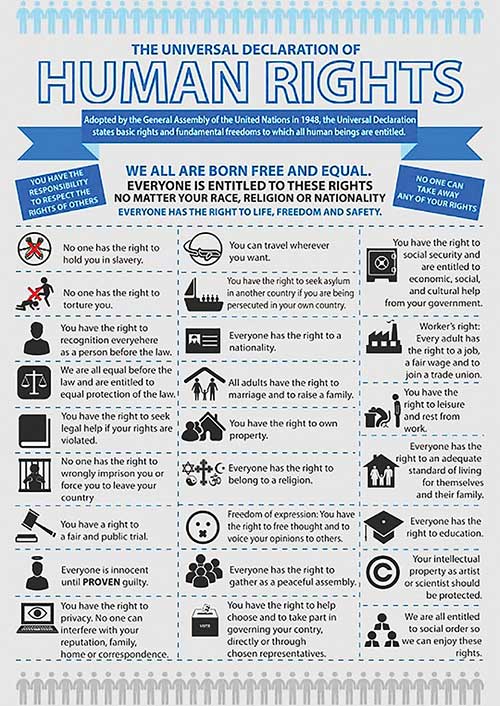Reading 5
The Universal Declaration of Human Rights
The devastation of World War II sparked an international desire for peace. It also encouraged the creation of a system of principles that could ensure the protection of basic human rights and dignity. Eleanor Roosevelt, the widow of President Franklin Delano Roosevelt, was one of the first American delegates to the United Nations. A longtime activist on behalf of minorities, women, workers, and refugees, Roosevelt became the chairperson of the UN Commission on Human Rights. She worked with a small group of representatives from countries around the world to define the most essential universal rights and establish them in an official document. On December 10, 1948, she urged the United Nations General Assembly to approve the Universal Declaration of Human Rights (UDHR):
In giving our approval to the Declaration today, it is of primary importance that we keep clearly in mind the basic character of the document. It is not a treaty; it is not an international agreement. It is not and does not purport to be a statement of law or of legal obligation. It is a Declaration of basic principles of human rights and freedoms, to be stamped with the approval of the General Assembly by formal vote of its members, and to serve as a common standard of achievement for all peoples of all nations.
We stand today at the threshold of a great event both in the life of the United Nations and in the life of mankind. This Universal Declaration of Human Rights may well become the international Magna Carta of all men everywhere. We hope its proclamation by the General Assembly will be an event comparable to the proclamation of the Declaration of the Rights of Man by the French people in 1789, the adoption of the Bill of Rights by the people of the United States, and the adoption of comparable declarations at different times in other countries.
At a time when there are so many issues on which we find it difficult to reach a common basis of agreement, it is a significant fact that 58 states have found such a large measure of agreement in the complex field of human rights. This must be taken as testimony of our common aspiration first voiced in the Charter of the United Nations to lift men everywhere to a higher standard of life and to a greater enjoyment of freedom. Man’s desire for peace lies behind this Declaration. The realization that the flagrant violation of human rights by Nazi and Fascist countries sowed the seeds of the last world war has supplied the impetus for the work which brings us to the moment of achievement here today. . . .
This Declaration is based upon the spiritual fact that man must have freedom in which to develop his full stature and through common effort to raise the level of human dignity. We have much to do to fully achieve and to assure the rights set forth in this Declaration. But having them put before us with the moral backing of 58 nations will be a great step forward.24

The Universal Declaration of Human Rights was adopted by the UN General Assembly in 1948. It states the basic rights and freedoms to which all people are entitled.
Arsal Aslam
The United Nations approved the declaration, but the work of the commission was only partially done. The UDHR, in Roosevelt’s words, “would say to the peoples of the world ‘this is what we hope human rights may mean to all people in the years to come.’” The second part of the commission’s work was to be “a covenant which would be in the form of a treaty to be presented to the nations of the world.” Every nation that ratified the treaty “would then be obligated to change its laws wherever they did not conform to the points contained in the covenant.”25 The commission thought a treaty might be worked out within the next few years, but this hope proved to be too optimistic. The work to secure human rights around the world remains an ongoing struggle.
Connection Questions
1. How does the UDHR differ from an international agreement or a “statement of law”?
2. In what ways was the UDHR a response to the past? In what ways did it present a responsibility for future generations?
3. Are there individual human rights that take precedence over the policies or declarations of any nation? Are there communal needs that might take precedence over the rights of an individual?
4. What needs to happen for the ideals expressed in the UDHR to become a reality?
5. The idea that there is a set of “universal” rights for people everywhere in the world remains controversial. Look up the full text of the UDHR online. Do the rights enumerated in the UDHR seem to fit all of the diverse cultures and belief systems across the globe? What rights do you think should be enjoyed universally by all people?
24 From Eleanor Roosevelt, “On the Adoption of the Universal Declaration of Human Rights,” in Great Speeches by American Women, ed. James Daley (Mineola, NY: Dover, 2008), 128–29.
25 From Eleanor Roosevelt, “The Struggle for Human Rights,” speech delivered September 28, 1948, in Paris, France, available from American Rhetoric, accessed June 26, 2016, http://www.americanrhetoric.com/speeches/eleanorroosevelt.htm.